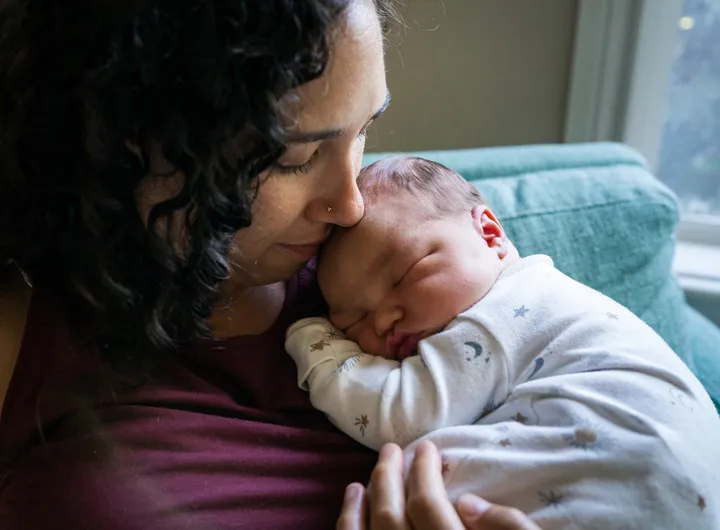Supports for Future and New Parents

Pictures of newborns make us smile. A social media announcement of a birth is greeted with congratulations and emojis of happiness and celebration. These moments of joy are, of course, only part of the picture.
For the new parents, it is a time of great change and adjustment. In addition to the physical changes of pregnancy, labour, and birth, new parents face demanding new roles, and changes in their relationships. The arrival of a first child is an emotionally intense time that can bring a range of feelings, from joy and fulfillment, to boredom, self-doubt, anxiety and frustration.
Keeping babies safe
From pregnancy onward parents are encouraged to keep their child safe. Governments play an important role in educating parents about safe means of transporting babies, feeding them, and helping them sleep. This guidance is constantly evolving, based on research findings of ways to minimize risks and maximize protections. First-time grandparents may be surprised to learn new guidance that is different from the practices they remember using when they were parenting young children.
Helping babies develop
In the early days and weeks of a baby’s life, the parents’ main task is to get to know their baby and help them regulate their eating and sleeping. Over repeated interactions with responsive adults during those precious early weeks the baby forms a secure attachment. This secure attachment provides the developing child with a safe base from which to explore the world.
Creating a secure attachment that is a solid base for their child’s development can feel like second nature to some new parents, but elusive for others.
Where does all the time go?
Many new parents found their lives busy and demanding before the baby’s birth. Feeding, settling, stimulating and playing with the new baby, and looking after their physical needs can be especially challenging in those early months of disturbed sleep.
Taking care of yourself
It’s easy to fall into the trap of thinking that the new parent must be a superhero, constantly available, responsive, patient and warm. New parents may feel guilty for taking time to re-charge their own batteries by doing something they find restorative. In fact, it’s real kindness to the child to ensure that you have the physical and emotional energy to care for them.
Changing adult relationships
Becoming a parent means not only learning how to interact with the baby, but also new ways to interact with adults. The most devoted parent cannot possibly do everything alone.
When two adults are parenting a newborn, they are likely both taking on more responsibilities than they had before the birth. Both may be tired, more reactive, and more emotionally vulnerable, so it’s really important to find ways to communicate with each other. New parents need to find ways to nurture their intimate adult relationships when they have less time and energy.
An increasing number of canadian mothers are single parents who may receive support from friends and family. Although well-intentioned, not all help may be as supportive as it could be, and parents need to find ways to communicate their needs and preferences.
All new parents can benefit from clear communication with other adults (such as grandparents or other caregivers) who wish to be supportive. Following the birth of a child parents may find their friendships changing too.
It can be overwhelming
Many new parents feel as though they are on an emotional roller-coaster. Within a single day they may have moments of peace, satisfaction, and joy, as well as worry, self-doubt, anger, and hopelessness.
For some parents, the negative thoughts and feelings may be overwhelming, so they are paralyzed by anxiety or depression that interferes with caring for the baby.
Conflicting messages
Once upon a time we used to say that babies don’t come with an instruction manual. Nowadays the sheer number of sources of information, from government health agencies, local public health, websites, parent influencers and friends on social media can be overwhelming. The lists of dos and don’ts can be daunting. It is tough for new parents to sift through and identify recommendations that are solid rather than an appealing trend that will one day be discredited, and to firmly set aside suggestions that are unhelpful or don’t fit. Suggestions are often contradictory. Parents may be confused and self-doubting about the right way for them to parent their child.
If there’s already so much information out there, do parents really need more support?
It’s clear that a successful transition to parenthood sets a child on a clear path to secure attachment, safe exploration and joy in discovering the world.
The risks of an unsuccessful transition are myriad, including child neglect and abuse, dysregulation, and a cascade of missed opportunities for the child to learn and develop.
Parents who have sustained difficulty in this transition may experience anxiety and depression that set them in a downward spiral of irritability, fear, and hopelessness that interfere with the parent-child relationship.
The stresses of the transition may also take a toll on the couple relationship, leading to conflict, distress, and relationship breakdown.
To prevent child maltreatment and enhance the parent-child relationship, the world health organization made a global recommendation to provide social-learning-based parenting support to parents of children aged 0-31.
A great example of a social-learning-based parenting support is triple p for baby. This program offers new parents support in establishing a positive relationship with their baby, learning to regulate their own emotions during this transition, and the ways they can communicate most helpfully with the adults who are also involved in their child’s life.
Triple p for baby is a multi-faceted program that addresses three essential aspects of a healthy transition to parenthood. Core messages normalize the challenges of the transition to parenthood. Parents are offered a menu of helpful strategies that they can choose in interacting with their baby. Once parents have explored the impact of the birth of their child and ways to promote a strong parent-child relationship, they may welcome the opportunity to learn concrete ideas on how to cope with intense emotions and look after themselves. Finally, they learn ways to communicate with their partner or other caregivers to ensure that they are getting the support they need.
Triple p for baby can be completed by parents during pregnancy or in the first year after birth. The program delivered by a trained practitioner from a variety of roles in different settings or accessed in an online program. This multi-faceted program addresses the needs of the baby, the parent and the co-parenting relationship. It enables parents to successfully navigate this important transition and sets the child and family on a solid course of learning and development. Along the way, parents learn the essential.
References
- WHO guidelines on parenting interventions to prevent maltreatment and enhance parent–child relationships with children aged 0–17 years. Geneva: World Health Organization; 2022. Licence: CC BY-NC-SA 3.0 IGO

